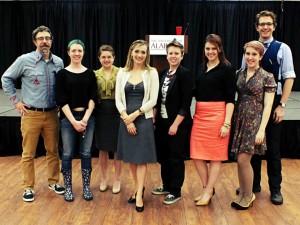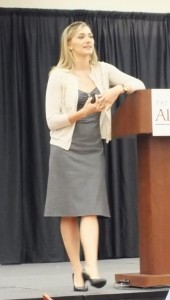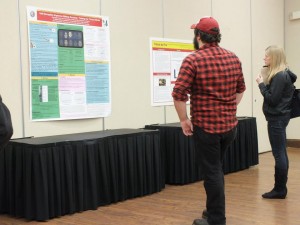On February 12, 2013, the UA EvoS Club hosted its 1st annual Darwin Day Colloquium. Aside from helping out with ALLELE speakers for the past few years, this was the first major activity of the UA EvoS Club, & I couldn’t have been more impressed with how it came together. We hope to extend the Colloquium next year to include more evolutionists from across the state, along with students from our Tuscaloosa Magnet School Elementary program! In the meantie, I asked EvoS Club president Malia Bunt, who has managed to keep the student evolution embers burning through a few initial lean years, to write up a guest post to summarize this year’s event.
By Malia Bunt.
 The University of Alabama’s Evolutionary Studies Club hosted its first annual Darwin Day Research Colloquium on Feb. 12, with keynote speaker Dr. Jamie Cloud of Birmingham-Southern College. The colloquium was designed to bring individuals from all over campus together to discuss their current work in evolutionary theory. Like the Evolutionary Studies minor, the program was designed with an interdisciplinary focus. While we’re all doing the same thing, sometimes those working with evolutionary theory on campus don’t get an opportunity to share and mingle.
The University of Alabama’s Evolutionary Studies Club hosted its first annual Darwin Day Research Colloquium on Feb. 12, with keynote speaker Dr. Jamie Cloud of Birmingham-Southern College. The colloquium was designed to bring individuals from all over campus together to discuss their current work in evolutionary theory. Like the Evolutionary Studies minor, the program was designed with an interdisciplinary focus. While we’re all doing the same thing, sometimes those working with evolutionary theory on campus don’t get an opportunity to share and mingle.
Throwing a first annual event is nerve-wracking, particularly for a group of inexperienced undergraduates. Everything had gone swimmingly up until the day of the Colloquium. We were expecting the worst the morning of. There was absolutely no way we would accept that the day would go off without any issue. But it did. The colloquium was really a great example of how if undergraduates pull together and put resources in a pool, we can pull off something really great.
The colloquium began with an introduction to the club and minor by Jessica King, who served as emcee for the day. We moved into a presentation by Dr. Michael Sandel, Biostatistics postdoc from UAB, called “A Hard NUMT to Crack: Characterizing Mitochondrial Pseudogenes in Genomes of Healthy and Malignant Human Cells.” To be honest, we were scared Dr. Sandel wasn’t going to show. We had only corresponded with him via e-mail once to get an abstract. We were concerned because he was working at the University of Alabama at Birmingham and had not asked for directions to or even on campus. When he walked in we were relieved, but confused. Turns out Dr. Sandel is a UA alum who is very supportive of what the club is attempting to do. Not to mention he did a swell job of explaining some pretty advanced mechanisms in the human body that have amazing implications.
Dr. Sandel was followed by me with a presentation titled “A Study in Human Habitat Selection and the Biophilia Hypothesis.” What’s really cool about my presentation, at least I think, is that it is the culmination of the EvoS minor and the ALLELE lecture series. I wrote the paper in an EvoS-required class, and it is based on Dr. E.O. Wilson’s biophilia hypothesis. Dr. Wilson was a visiting lecturer in the ALLELE series last semester and had it not been for his visit, I may have never been exposed to his hypothesis. Possibly even his work!
J. Brett Smith gave a great presentation on “The Prospect of Darwinian Self-Help.” Applying evolutionary theory to health outcomes has always been surprising to me because it seems to come out of left field. Until you start to understand human evolutionary history, you can’t understand concepts like maladaptation in current diets. Smith asserted that we live in a very different environment now and our health outcomes reflect that. Using himself as a lab rat, he began to move his diet to mirror more of what we would have been doing before the agricultural revolution. This means no beer–tough stuff dude. At his annual checkup after applying the diet, he found that his overall health increased as he moved his diet closer to our ancestors. His presentation had overall implications for understanding our bodies (and even allowed us to lash out at the government a bit).
We sailed straight into Brandi Lowe’s presentation on her plans for a study in the “Heritability of the Shy/Bold Continuum.” This was another great undergraduate presentation supporting the classes in the minor that have us thinking about research, at the undergraduate level. Brandi is a student in Dr. Christopher Lynn’s “Evolution for Everyone,” which is the foundation course for the rest of the minor. It introduces you to every facet of evolution you can think of–philosophy, geology, history, anthropology, and biology. Most of all, Dr. Lynn requires undergraduates to design research projects that can be (and are expected to if you enroll in the minor) implemented in your undergraduate career. Doing research as an undergraduate enhances your overall training in college. It allows us to enter graduate school or the work force with tools for every other graduate to be jealous of. Brandi has been recently accepted to Dr. Ryan Earley’s lab in Biology and will be working with him to finish the project.
When Meghan Steel, coordinator of the speaker’s schedules, got the e-mail from Dr. Patrick A. Frantom, an Assistant Professor of Biochemistry at UA, we were all overwhelmed. Two people from outside the minor want to come and give a presentation! At the beginning of planning the colloquium I decided that was our goal. If we reach out to at least a few people outside the UA EvoS minor and Anthropology/Biology departments, we have succeeded. Dr. Frantom gave a presentation on the “Evolution of Allosteric Regulation in a Multi-Domain Enzyme.” To be honest, the material was way over my head, but Dr. Frantom obviously has some experience with undergraduates because he didn’t lose my interest. It was an absolute joy to have him come speak.
Undergraduate Erica Schumann presented the work she has been doing with Dr. Lynn and the Human Behavioral Ecology Research Group (lovingly dubbed HBERG) in “Group selection in Religious Communities: Assessing Sustainability in Unitarian Universalism.” This was the first presentation Erica had given on research and had been told members of the church were going to be in attendance, so she was a bit nervous. But she bucked up and gave a great presentation on group selection, a hot topic in evolution. She also discussed the “workbooks” HBERG is using to train incoming undergraduates to do research, the easy way. Erica and I were thankful for the colloquium in that it allowed for us to present to a smaller group in a setting we feel comfortable with. Those in attendance were undergraduates just like us, with some graduate students and professors in the mix. It was easy for us to look people in the eye that we see every day and share some science, and it made presentations we gave at a professional conference a couple of weeks later much easier.

Keynote speaker Jaime Cloud with EvoS Club (Dr. Lynn, Meghan Steel, Malia Bunt, Dr. Cloud, Brandi Lowe, Jessica King, Laura Moore, Jonathan Belanich)
After a short break for food, our keynote speaker Dr. Jamie Cloud was up to speak. We were all excited about her presentation on “The Meaning of Beauty: Cues of Women’s Fertility and Reproductive Value.” Dr. Cloud discussed attractiveness in measurable elements, like waist-to-hip ratio and facial cues. It has been established that humans use facial cues in a variety of ways, so why not fertility? She and her lab have been working to determine what men use to determine if an individual would be a good long-term mating partner, the face or body. Dr. Cloud was a great speaker and her material was so resonant for everyone. She discussed future research plans of her lab based on their findings and other questions they’d like to pursue. The audience found her results so interesting they had a rousing post-presentation question session. In such an intimate setting, it was easy to approach Dr. Cloud with questions we had about her research or even some of our own as Laura Moore did.
So without any dire issues, the First Annual UA Evos Club Darwin Day Research Colloquium took off. I said it before in this post, but it’s important enough for me to say again: if we reached out to people who aren’t involved with the minor and got them involved, I feel we have succeeded. I saw many unfamiliar faces and tons of familiar faces. The University needed an event to honor a great naturalist with a great theory, and I feel the colloquium did just that. I know we’re all looking forward next year’s!
Malia Bunt is a junior from Florence, Alabama majoring in Anthropology and minoring in Evolutionary Studies. She is the president of the EvoS Club who has been inspired by her close contacts with ALLELE speakers. Upon graduating, she hopes to go to law school and integrate her experiences in a manner similar to the lawyers affiliated with the National Center for Science Education.


